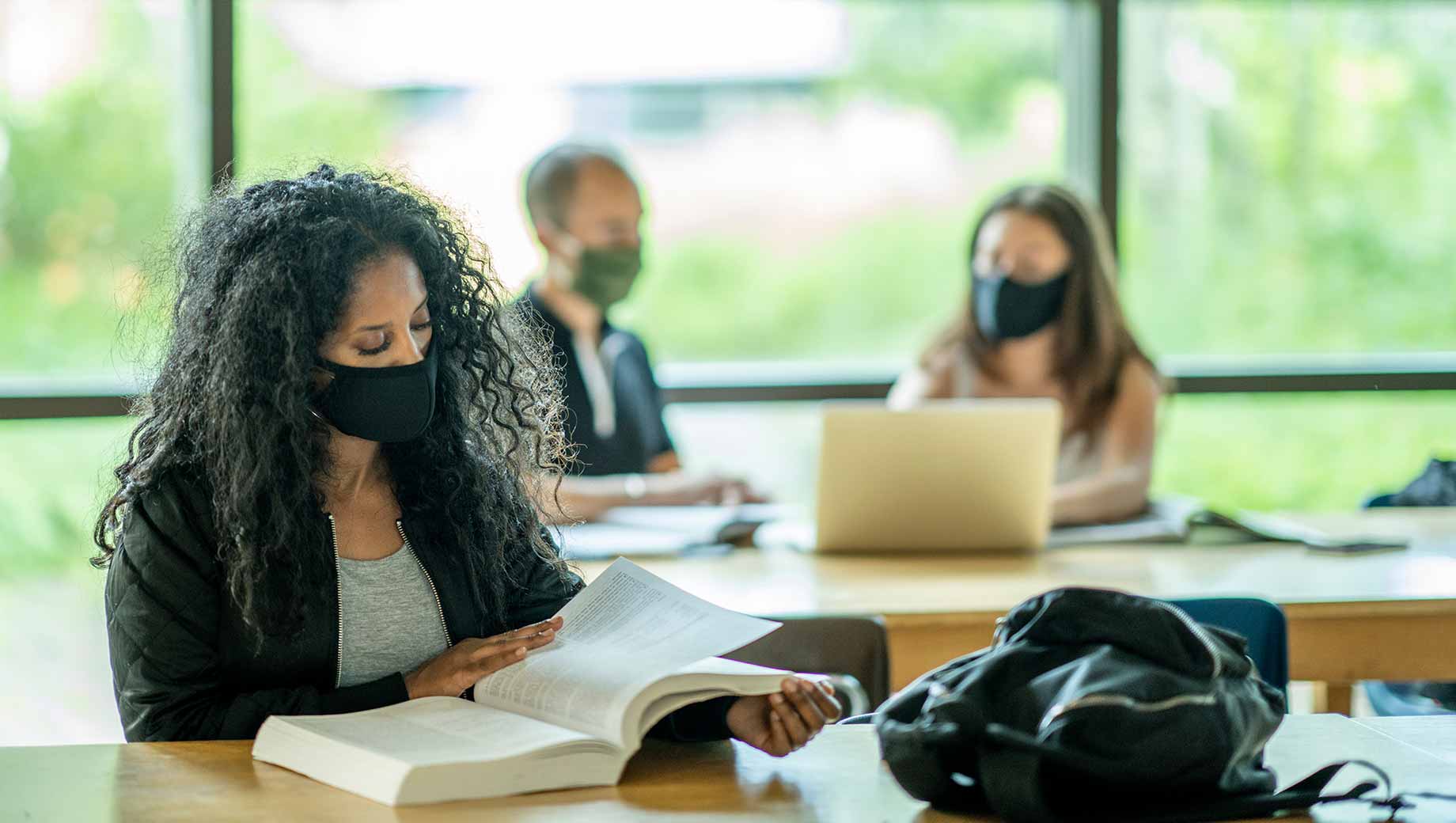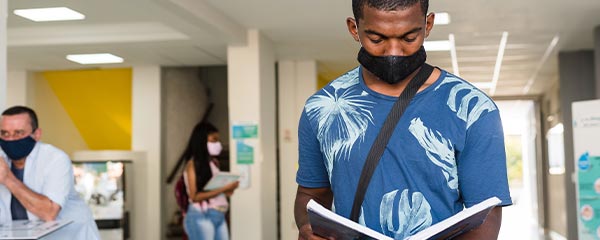WASHINGTON, D.C. -- About half of currently enrolled college students nationally who are pursuing a bachelor's degree (49%) think it is likely or very likely that COVID-19 will negatively impact their ability to complete their degree or credential. The slight majority of students pursuing their associate degree (56%) say the same.
| Pursuing bachelor's degree | Pursuing associate degree | ||||||||||||||||||||||||||||||||||||||||||||||||||||||||||||||||||||||||||||||||||||||||||||||||||
|---|---|---|---|---|---|---|---|---|---|---|---|---|---|---|---|---|---|---|---|---|---|---|---|---|---|---|---|---|---|---|---|---|---|---|---|---|---|---|---|---|---|---|---|---|---|---|---|---|---|---|---|---|---|---|---|---|---|---|---|---|---|---|---|---|---|---|---|---|---|---|---|---|---|---|---|---|---|---|---|---|---|---|---|---|---|---|---|---|---|---|---|---|---|---|---|---|---|---|---|
| % | % | ||||||||||||||||||||||||||||||||||||||||||||||||||||||||||||||||||||||||||||||||||||||||||||||||||
| Very unlikely | 14 | 11 | |||||||||||||||||||||||||||||||||||||||||||||||||||||||||||||||||||||||||||||||||||||||||||||||||
| Unlikely | 37 | 33 | |||||||||||||||||||||||||||||||||||||||||||||||||||||||||||||||||||||||||||||||||||||||||||||||||
| Likely | 32 | 36 | |||||||||||||||||||||||||||||||||||||||||||||||||||||||||||||||||||||||||||||||||||||||||||||||||
| Very likely | 17 | 20 | |||||||||||||||||||||||||||||||||||||||||||||||||||||||||||||||||||||||||||||||||||||||||||||||||
| Lumina-Gallup Student Study, Sept. 22-Oct. 5, 2020 | |||||||||||||||||||||||||||||||||||||||||||||||||||||||||||||||||||||||||||||||||||||||||||||||||||
These results are from the Lumina-Gallup Student Study, conducted Sept. 22-Oct. 5, 2020, with 3,941 students pursuing a bachelor's and 2,064 students pursuing an associate degree. Surveys were conducted using an opt-in panel, and the sample was weighted to represent the national population of currently enrolled college students.
COVID-19's Impact on Completion Stronger for Black and Hispanic Students
Black and Hispanic students pursuing their bachelor's or associate degree are more likely than their peers to believe COVID-19 is likely or very likely to adversely affect their ability to complete their degree/credential. Among those pursuing a bachelor's degree, 44% of currently enrolled White students versus 56% of both Black and Hispanic students expect COVID-19 to negatively affect their ability to finish their degree. There is a similar racial/ethnic gap among those pursuing an associate degree, with 52% of White students versus 60% of Black and Hispanic students expecting problems.
| Very unlikely/Unlikely | Very likely/Likely | |||||||||||||||||||||||||||||||||||||||||||||||||||||||||||||||||||||||||||||||||||||||||||||||||||
|---|---|---|---|---|---|---|---|---|---|---|---|---|---|---|---|---|---|---|---|---|---|---|---|---|---|---|---|---|---|---|---|---|---|---|---|---|---|---|---|---|---|---|---|---|---|---|---|---|---|---|---|---|---|---|---|---|---|---|---|---|---|---|---|---|---|---|---|---|---|---|---|---|---|---|---|---|---|---|---|---|---|---|---|---|---|---|---|---|---|---|---|---|---|---|---|---|---|---|---|---|
| % | % | |||||||||||||||||||||||||||||||||||||||||||||||||||||||||||||||||||||||||||||||||||||||||||||||||||
| Pursuing bachelor's degree | ||||||||||||||||||||||||||||||||||||||||||||||||||||||||||||||||||||||||||||||||||||||||||||||||||||
| White students | 55 | 44 | ||||||||||||||||||||||||||||||||||||||||||||||||||||||||||||||||||||||||||||||||||||||||||||||||||
| Black students | 44 | 56 | ||||||||||||||||||||||||||||||||||||||||||||||||||||||||||||||||||||||||||||||||||||||||||||||||||
| Hispanic students | 44 | 56 | ||||||||||||||||||||||||||||||||||||||||||||||||||||||||||||||||||||||||||||||||||||||||||||||||||
| Pursuing associate degree | ||||||||||||||||||||||||||||||||||||||||||||||||||||||||||||||||||||||||||||||||||||||||||||||||||||
| White students | 48 | 52 | ||||||||||||||||||||||||||||||||||||||||||||||||||||||||||||||||||||||||||||||||||||||||||||||||||
| Black students | 40 | 60 | ||||||||||||||||||||||||||||||||||||||||||||||||||||||||||||||||||||||||||||||||||||||||||||||||||
| Hispanic students | 40 | 60 | ||||||||||||||||||||||||||||||||||||||||||||||||||||||||||||||||||||||||||||||||||||||||||||||||||
| Lumina-Gallup Student Study, Sept. 22-Oct. 5, 2020 | ||||||||||||||||||||||||||||||||||||||||||||||||||||||||||||||||||||||||||||||||||||||||||||||||||||
Students at Risk of Dropping Out Lack Support System at Home
Bachelor's degree students who are most likely to say COVID-19 will negatively impact their ability to complete their degree have a weaker support system. While 44% of bachelor's degree students who strongly agree that they have a support system also say COVID-19 is likely or very likely to negatively impact their ability to complete their degree, this increases to 62% of those who strongly disagree that they have such a support system.
| I have family members or friends I can count on for help. | |||||||||||||||||||||||||||||||||||||||||||||||||||||||||||||||||||||||||||||||||||||||||||||||||||
|---|---|---|---|---|---|---|---|---|---|---|---|---|---|---|---|---|---|---|---|---|---|---|---|---|---|---|---|---|---|---|---|---|---|---|---|---|---|---|---|---|---|---|---|---|---|---|---|---|---|---|---|---|---|---|---|---|---|---|---|---|---|---|---|---|---|---|---|---|---|---|---|---|---|---|---|---|---|---|---|---|---|---|---|---|---|---|---|---|---|---|---|---|---|---|---|---|---|---|---|
| % 1 --Stronglydisagree | % 2 | % 3 | % 4 | % 5 --Stronglyagree | |||||||||||||||||||||||||||||||||||||||||||||||||||||||||||||||||||||||||||||||||||||||||||||||
| Very unlikely/Likely | 37 | 45 | 44 | 51 | 56 | ||||||||||||||||||||||||||||||||||||||||||||||||||||||||||||||||||||||||||||||||||||||||||||||
| Very likely/Likely | 62 | 56 | 56 | 49 | 44 | ||||||||||||||||||||||||||||||||||||||||||||||||||||||||||||||||||||||||||||||||||||||||||||||
| Lumina-Gallup Student Study, Sept. 22-Oct. 5, 2020 | |||||||||||||||||||||||||||||||||||||||||||||||||||||||||||||||||||||||||||||||||||||||||||||||||||
Many students are unaware of aid colleges offer to students in need to allow them to continue in their degree program. Although food assistance is available at many colleges nationally, just 43% of students pursuing their bachelor's degree report that their school offers food assistance of any kind. Gallup finds awareness of these programs is lowest among first-generation college students -- students for whom these programs are particularly important because of their lower degree-completion rates nationally.
| Pursuing bachelor's degree | Pursuing associate degree | ||||||||||||||||||||||||||||||||||||||||||||||||||||||||||||||||||||||||||||||||||||||||||||||||||
|---|---|---|---|---|---|---|---|---|---|---|---|---|---|---|---|---|---|---|---|---|---|---|---|---|---|---|---|---|---|---|---|---|---|---|---|---|---|---|---|---|---|---|---|---|---|---|---|---|---|---|---|---|---|---|---|---|---|---|---|---|---|---|---|---|---|---|---|---|---|---|---|---|---|---|---|---|---|---|---|---|---|---|---|---|---|---|---|---|---|---|---|---|---|---|---|---|---|---|---|
| % | % | ||||||||||||||||||||||||||||||||||||||||||||||||||||||||||||||||||||||||||||||||||||||||||||||||||
| Tutoring/Academic support | 72 | 52 | |||||||||||||||||||||||||||||||||||||||||||||||||||||||||||||||||||||||||||||||||||||||||||||||||
| Emergency financial help | 67 | 51 | |||||||||||||||||||||||||||||||||||||||||||||||||||||||||||||||||||||||||||||||||||||||||||||||||
| Mental health services | 58 | 31 | |||||||||||||||||||||||||||||||||||||||||||||||||||||||||||||||||||||||||||||||||||||||||||||||||
| Food assistance | 43 | 32 | |||||||||||||||||||||||||||||||||||||||||||||||||||||||||||||||||||||||||||||||||||||||||||||||||
| Career counseling | 38 | 33 | |||||||||||||||||||||||||||||||||||||||||||||||||||||||||||||||||||||||||||||||||||||||||||||||||
| Childcare support | 19 | 20 | |||||||||||||||||||||||||||||||||||||||||||||||||||||||||||||||||||||||||||||||||||||||||||||||||
| Lumina-Gallup Student Study, Sept. 22-Oct. 5, 2020 | |||||||||||||||||||||||||||||||||||||||||||||||||||||||||||||||||||||||||||||||||||||||||||||||||||
Summary
COVID-19 has created unprecedented challenges for currently enrolled college students. The economic impacts of the pandemic have been devastating for students and their families, with many worried about how a loss of job or income may affect their ability to stay enrolled or change how they finance their degree. Higher education has experienced such financial hardship before -- in 2008, during the last economic crisis, many students experienced similar struggles -- but it has never been challenged by an economic crisis amid a health pandemic. The collective challenges students face in the 2020-2021 academic year -- financial hardship, health concerns, increased caregiving responsibilities -- are both severe and complex, making their concerns about completing school understandable.
Importantly, this research indicates many also lack a sufficient support system in their personal lives to overcome these challenges, placing additional pressure on institutions as they attempt to retain these students in spring 2021 and beyond. While institutions have implemented programs to assist students with these challenges, many students still report they are unaware of resources that their institution may offer to support their ongoing needs. As schools prepare for an equally challenging spring, it is crucial that they increase awareness of these services for students with the greatest need.




